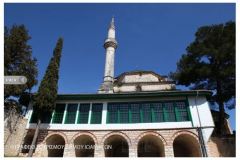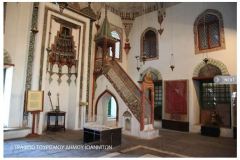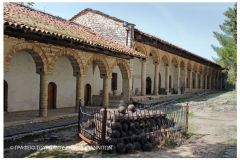
Municipal Ethnographic Museum of Ioannina
The Municipal Ethnographic Museum of Ioannina is situated in the building of the mosque of Aslan Pasha in the northwestern citadel of the Ioannina castle. The Aslan mosque was built in 1618 on the relics of the church of Agios Ioannis Prodromos (= Saint John the Baptist) to commemorate the success of Aslan Pasha in quelling the rebellion of Bishop Dionysios the Philosopher. From then on the city’s Christians were expelled from the castle, while all churches and monasteries in the castle were demolished.
The Aslan mosque is one of the two mosque buildings of the Ioannina castle. The second one is the Fetihie mosque (= mosque of conquer), situated in the southeastern citadel next to the tomb of Ali Pasha and the relics of his sarai (= palace).
The city of Ioannina was liberated from the Ottomans in 1913. The Aslan mosque did not cease its operation until 1924, when the Turkish minority left the area as part of the population exchange under provisions in the Treaty of Lausanne, which followed the Greco-Turkish War (1919-1922) and the Asia Minor Catastrophe (1922). Since 1933 the building of the Aslan mosque has been hosting the Municipal Ethnographic Museum of Ioannina.
THE MUSEUM’S EXHIBITS
Recent restoration and re-exhibition works aim to promote both the architectural features of the building and the museum objects, which comprise material evidence of the harmonic, productive and prosperous life of three communities living in Ioannina from the 15th to the early 20th century: the Greek-Christian community, the Turkish-Muslim community and the Jewish community.
Museum objects came from donations of families from Ioannina, such as the Vafeiades, the Vlachleides, the Pallis, the Pyrsinellas, the family of Archbishop Spyridon and many others.
Address: Castle of Ioannina, Al. Noutsou 18
Phone number: +30 26510 26356
Website: www.ioannina.gr/DI/politismos/dimotiko_mouseio.htm




